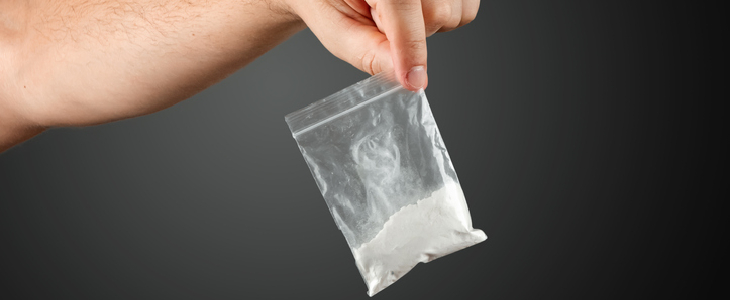Cocaine possession is one of the most commonly charged drug crimes in Texas and the Greater Houston area. Possession of any amount of cocaine is a felony in Texas. The consequences can include jail or prison time, fines, probation and a conviction on your record. Fortunately, an experienced criminal defense attorney can help maximize your chances of keeping a possession of cocaine case off of your record. Below are some the most frequently asked questions regarding cocaine possession cases.
What are the penalties for possession of cocaine?
The potential penalties for the possession of cocaine are based on the weight of the substance. According to Texas Health and Safety Code 481.102(D), cocaine is classified as a Penalty Group 1 substance. The penalties are contained in Texas Health and Safety Code 481.115:
Under one gram: State jail felony punishable by 180 to 2 years and a fine of up to $10,000.
Between 1 to 4 grams: Third-degree felony punishable by 2-10 years and a fine of up to $10,000.
Between 4 grams to 200 grams: Second-degree felony publishable by 2-20 years and a fine of up to $10,000.
Between 200 grams to 400 grams: First-degree felony punishable by 5-99 years and a fine of up to $10,000.
More than 400 grams: Punishable by 10-99 years and a fine of up to $10,000.
What bond conditions can I expect in a possession of cocaine case?
The bond conditions that will be assessed in a possession of cocaine case will depend on the facts of the case (particularly the amount of cocaine you are alleged to have possessed), your criminal history, the prosecutor, and the judge. In the Houston area, you will typically be subject to random urinalysis, be ordered to not possess or consume drugs or alcohol, and possibly have limitations placed on your travel.
If you hire a criminal defense attorney before your first court date, your attorney can advocate on your behalf at the time bond conditions are set to ensure that they are not overly restrictive. It is very important that you clearly understand your bond conditions and that you abide by them carefully. The most common reason a defendant charged with possession of cocaine has his bond revoked is by having a failed urine test. Bond conditions in a possession of cocaine case will remain in effect until your case is resolved.
What if I was arrested for possession of cocaine and the officer did not read my Miranda rights?
This is a very common question. Contrary to popular belief, the failure of the police to read your Miranda rights in a possession of controlled substance case will not result in an automatic dismissal of the charges against you.
The general rule is that if you are under arrest (or the legal equivalent of being under arrest) and the police interrogate you, they must read you your Miranda warnings prior to asking you any questions. If the police fail to read your Miranda warnings when they are legally obligated to, then a criminal defense attorney should file a motion to suppress, to ask the judge to exclude statements that were obtained in violation of Miranda.
If illegally collected statements were a critical part of the prosecutor’s case, that could lead to the dismissal of your controlled substance case. But this will depend on the facts of the case. An experienced cocaine possession attorney will be able to determine what the possible remedy is to a Miranda violation.
What is the best strategy to get my possession of cocaine case dismissed?
There is no single strategy that works best. The best strategy for obtaining a dismissal – or whatever the best possible result may be – in a possession of cocaine case will depend on the facts of your particular case. But whatever the facts are, it will always be necessary for your drug possession attorney to obtain all of the evidence first. In most cocaine possession cases, the evidence consists of police reports, lab reports, search warrants, videos and witness statements.
Your attorney should always begin by aggressively challenging every piece of evidence. In drug possession cases, this typically involves challenging whether the police had the right to search homes, people, or cars, or whether they had the right to detain people or conduct interrogations. Additionally, your attorney will want to challenge whether the prosecutor can prove that a defendant knowingly possessed the cocaine.
The reality is that in some cases, the facts will not be on the side of the defense. In these cases, a defense attorney should explore other options for getting a case dismissed, such as a pre-trial diversion. In the Houston area, many District Attorneys’ offices recognize that many people who commit cocaine offenses involving a small amount of drugs deserve a chance to keep their records clean, and are willing to offer dismissals through pre-trial diversion programs, or RIC court, which is discussed below.
What is RIC court?
In Houston, many first-time possession of controlled substances cases, including possession of cocaine, are referred to a special court known as Responsive Interventions for Change (RIC) court. This is a special court created in conjunction with the Harris County District Attorney’s Office that emphasizes treatment and second chances rather than jail and criminal convictions. If you are alleged to have possessed less than four grams of cocaine, your case may be transferred to RIC court. Prosecutors in RIC court are much more likely to offer pre-trial diversions to defendants if they are willing to undergo treatment or participate in other programs. In many cases, the options available through RIC court are a good way to resolve the case and keep a possession of cocaine case off of your record. Nevertheless, an effective attorney should still do his job and challenge the evidence.
What if I am not a United States citizen and am charged with possession of cocaine?
If you are not a United States citizen and are charged with possession of cocaine, the stakes are even higher. A conviction or deferred adjudication for possession of cocaine can lead to severe immigration consequences, including loss of status or deportation. Ceja Law Firm focuses its practice on criminal defense, but because many of our clients are not United States citizens, we work closely with immigration attorneys to ensure that nothing that happens in the cocaine case will adversely impact a client’s immigration situation.
How do I choose a lawyer for a possession of cocaine case?
There are many things to consider when choosing an attorney for a possession of cocaine case. Probably the most important consideration is whether the attorney has relevant experience. Cases involving possession of controlled substances can be highly specialized and involve a complex area of law known as search and seizure, which impacts most cocaine cases. Almost all cocaine cases involve searches of cars, homes, people or luggage and an attorney should have the experience to contest the validity of the search.
In addition, an attorney should have trial experience. Although the goal is always to get a possession of controlled substance case dismissed without the need for a trial, an effective attorney should have the willingness to go to trial, as well as the skill set necessary to obtain an acquittal. Finally, you should feel comfortable with your attorney on a personal level and choose an attorney who can communicate effectively and explain things to you clearly.
After finishing law school, attorney Jose Ceja worked as a prosecutor where he was assigned to a division focusing on the prosecution of large drug cases. In his career, he has handled thousands of drugs cases and has extensive knowledge and experience with search and seizure law. In 2010, he began his career as a defense attorney at one of the most prestigious defense firms in the State of Texas. In 2019, Mr. Ceja founded Ceja Law Firm, where he consistently obtains excellent results in possession of controlled substance cases throughout the Greater Houston area. If you have been charged with possession of cocaine, or any controlled substance, Mr. Ceja would be happy to offer a free consultation to discuss your situation. Call today.









